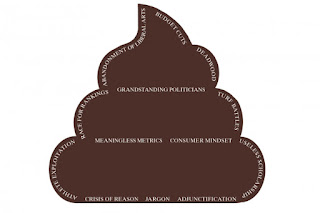In both scope and eloquence, this article goes far beyond my post, The rise of BS in science and academia. Furthermore, as a sociologist, Smith argues that one of the challenges, is to the think about the problem in collective (dare I say emergent!) terms, rather than just individualistic terms.
Essential to realize in all of this is that most of the BS is produced not by pernicious individuals, but instead by complex dysfunctions in institutional systems. It is easy to be a really good academic or administrator and still actively contribute to the BS. So we need to think not individualistically, but systemically, about culture, institutions, and political economies. Pointing fingers at individual schools and people is not helpful here. Sociological analysis of systems and their consequences is.Smith also spells out the broader moral and political implications of the problems.
In the end, a key issue, central to the problem, is there are many competing ideas and interests concerning what a university is actually for. That ultimately comes from different values and world views, leading to different ethical, moral, and political perspectives. Nevertheless, the core mission should be clear: it is thinking about the world and training students to think.
I agree with Smith,
BS is the failure of leaders in higher education to champion the liberal-arts ideal — that college should challenge, develop, and transform students’ minds and hearts so they can lead good, flourishing, and socially productive lives — and their stampeding into the "practical" enterprise of producing specialized workers to feed The Economy.Aside: One interesting feature of the comments on the article, is how much the problem of students using cell phones in class gets discussed.
I thank Mike Karim for bringing the article to my attention.





Oh my, what to say. I must say something.
ReplyDeleteOutside the hardest of the hard sciences, pure math, engineering, business, and the physical constructions of the Art department, a University is pervaded by BS.
"BS is the failure of leaders in higher education to champion the liberal-arts ideal — that college should challenge, develop, and transform students’ minds and hearts so they can lead good, flourishing, and socially productive lives"
That statement is utterly the reverse of reality!
"the liberal-arts ideal — that college should challenge, develop, and transform students’ minds and hearts so they can lead good, flourishing, and socially productive lives"
IS the very CORE of BS itself. The words reek of BS. The courses that purport to do that are generally near pure BS. That piece of writing is a clarion call for the establishment of **BS AS GOD**
Long ago when I went to Rice, this was clearly recognized by everyone, and a goodly hunk of the science-side people called it out for what it was **and got away with that! ... something that would be mercilessly attacked today**.
Thanks for the comment.
ReplyDeleteI disagree on several points.
First, as I argued in my earlier post, BS in the University is now prevalent in science.
Perhaps it is not as bad as the humanities. But it is very present and corrosive.
Second, although today the humanities and social sciences may contain a lot of BS, they have not always. I contend that there was a time when courses in history, philosophy, and literature were intellectually rigorous and of immense value to students. I wish I had got to take some.
I don't believe in scientism (that science has all the answers) or that physics is the gold standard of truth and intellectual rigour.
“Never tell a lie when you can bullshit your way through it” .
ReplyDeleteEric Ambler quote.
I believe BS is everywhere nowadays. The signal to noise ratio has been decreasing over the years. To be heard, the signal must be attenuated. Announcement are done in the most extravagant way at blazing speed. This reduces the time to ponder and think, and of course often requires a bit more "sauce". This also means, sadly, signal attenuation also has a side effect of increasing noise. The process of increase signal and increase noise then repeats, each time decreasing the signal to noise ratio, causing more and more BS.
ReplyDeleteSadly, this also happens in academia. The exact place that's suppose to give conducive environments for people to ponder and think.
Thanks for the helpful comment.
DeleteI read that article linked from another source... and it reminded me to come here to see what the latest post was. It resonated with me, having spent most of Monday of this week shifting publications around between categories to optimise our numbers for a research assessment exercise...
ReplyDeleteI have sympathy. I have spent too much time the past week finding and formatting silly information for an ARC grant application.
Delete